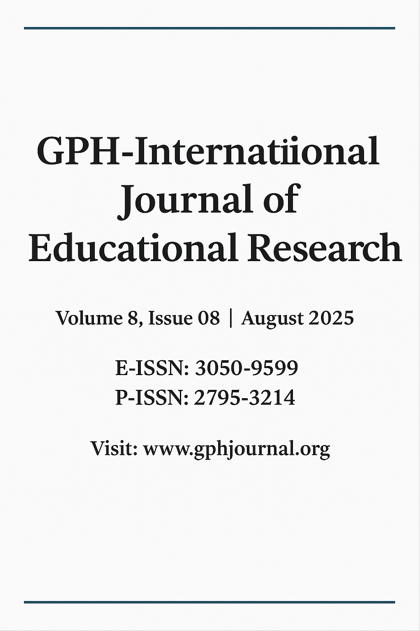Building a Competency Assessment Framework for Grade 10 Physics: An Urgent Need from Teaching Practice
Abstract
The context of implementing the 2018 General Education Curriculum requires a profound change in the assessment activities for Grade 10 Physics, shifting from a content-oriented approach to developing learners' competencies. This paper presents the main findings from a survey study aimed at clarifying the current state of teachers' perceptions, difficulties, and needs during this transition. Using a questionnaire survey method with 20 Physics teachers at high schools in Thai Nguyen province, data were collected and analyzed using descriptive statistics. The research results paint a challenging picture: the majority of teachers lack confidence and detailed guidance materials; they face significant pressure as developing matrices and assessment questions in the new orientation is considered too complex and time-consuming, leading to a common trend of reusing questions from old question banks. This situation also affects students, leaving them confused with new ways of learning and taking tests. Most notably, the study records a near-unanimous consensus (95%) on the urgent need for a standardized reference framework and question bank. These findings confirm the existence of a “difficulty loop” that is hindering the innovation process, while also emphasizing the urgency of building and implementing effective professional support tools to help teachers overcome barriers and bring the spirit of the new curriculum into practice.
Downloads
References
Anh, H. S. (2019). Understanding student assessment and innovating student assessment towards a competency-based approach.
Ho Chi Minh City University of Education Journal of Science, (50), 131-131.
Black, P., & Wiliam, D. (1998). Inside the Black Box: Raising Standards Through Classroom Assessment.
Phi Delta Kappan, 80(2), 139-148.
Ministry of Education and Training. (2018).
Circular No. 32/2018/TT-BGDĐT dated December 26, 2018, promulgating the General Education Program.
Khanh, N. C. (2016). Innovating high school student assessment according to the competency-based approach. National conference on building the general education curriculum.
Lê, T. T. H., Phạm, K. C., Lê, C. N., Vũ, T. T., & Nguyễn, T. L. N. (2024). Developing criteria for assessing STEM teaching competency of general education teachers in Vietnam. Journal of Education, 24(11), 110–115. Retrieved from
https://tcgd.tapchigiaoduc.edu.vn/index.php/tapchi/article/view/2759.
Mullis, I. V. S., & Martin, M. O. (Eds.). (2017). TIMSS 2019 Assessment Frameworks. Boston College, TIMSS & PIRLS International Study Center.
Resolution No. 29-NQ/TW, issued on November 4, 2013, by the 11th Central Committee of the Communist Party of Vietnam.
Nguyễn Văn Biên. (2016). Proposing a competency framework and teaching orientation for Physics in high schools.
Hanoi National University of Education Journal of Science, 61(9), 112-119. https://doi.org/10.18173/2354-1075.2016-015.
OECD. (2019). PISA 2018 Assessment and Analytical Framework. PISA, OECD Publishing.
https://doi.org/10.1787/b25efab8-en
Phạm, T. T. H. (2024). A study on building a question bank for periodical assessment in high school Literature. Journal of Education, 24(special issue 4), 38–42. Retrieved from
https://tcgd.tapchigiaoduc.edu.vn/index.php/tapchi/article/view/1971.
Trần, T. H., & Nguyễn, V. H. (2020). Difficulties of high school teachers in implementing the innovation of assessing students' learning outcomes.
Journal of Education, 478, 10-15.
Vũ, P. L., Vũ, D. N., & Lê, T. H. (2024). The current state of primary school teachers' perception and practice of student assessment according to the competency-based approach. Journal of Education, 24(2), 44–50. Retrieved from
https://tcgd.tapchigiaoduc.edu.vn/index.php/tapchi/article/view/1369.
Author(s) and co-author(s) jointly and severally represent and warrant that the Article is original with the author(s) and does not infringe any copyright or violate any other right of any third parties, and that the Article has not been published elsewhere. Author(s) agree to the terms that the Global Publication House will have the full right to remove the published article on any misconduct found in the published article.























